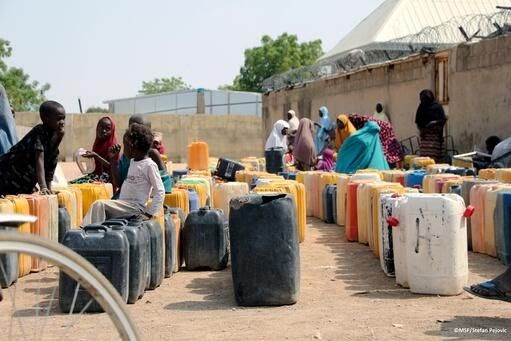Climate Change, Insecurity Affecting Access To Clean Water In Borno – MSF
Displaced persons in Borno State, Northeast Nigeria are facing acute water shortage due to insurgency and climate change

The water scarcity in Borno State, Northeast Nigeria has worsened over the past decade due to the increase in persons displaced by insurgency, a report by Medecins Sans Frontieres (MSF), also known as Doctors Without Borders, has said.
According to the report, the harmattan season in the Sahel region which lasts from Nov. to May brings about extreme hardships when it comes to accessing water. This has always been a cause for concern for local farmers even before the crisis in the region began.
These factors have forced the people of Pulka, a community in Borno to either buy water or fetch from nearby water ponds, making them prone to water-borne diseases such as diarrhoea, MSF said in the report.
Fati, an IDP who settled in the community of Pulka, said the issue of insufficient water is very serious.
“When we have money, we buy water from the well, but if we don’t have any, we have to fetch it from the pond and this makes our children sick,” she explained.
According to MSF, the situation becomes so dire that sometimes, they have to exchange their food produce for water.
Others make money by selling water from already existing water sources constructed by humanitarian groups.
Due to pollution or the water not being properly treated with chlorine, this causes health issues, especially in children, who are more susceptible to the disease.
“Water trucking was also introduced by different Water, Sanitation and Hygiene (WASH) actors as a temporary solution,” the organisation said.
“However, logistical issues due to frequent closures on the main road to Maiduguri mean this option is not reliable, leaving Pulka residents with no choice but to use the pond. Even when there is enough water, the bigger issue is the quality of this essential resource.”
The report also stated that the MSF hospital in Pulka which provides healthcare to the residents of the community recorded approximately 58,000 patients, with a majority of them treated for respiratory infections and water-related diseases in 2020.
A resident, Cecilia, brought her baby to the hospital for a case of diarrhoea, and complaints of abdominal pain and catarrh which was attributed to the water they sourced from the local pond.
“We usually get our drinking water from the solar borehole in the morning. If we didn’t go in the morning, we wouldn’t get any water. We sometimes drink the water from the local pond, but only if we have the chemicals to treat it. But for now, we don’t drink the water from the pond because children play and have their bath in it,” she said.
Mohammed, who was also a hospital patient, urged for improved measures to ensure clean and safe water is available to the community’s population, and also blamed the pond for the abdominal pain many experienced after drinking its water.
“We get our water from the pond. But the water has lots of dirt in it; it’s not treated and that is why we constantly have abdominal problems and related illnesses. Our major problem here in Pulka is the problem of water, as it gives us abdominal pain. For about two weeks now, I’ve not been feeling well. From one illness to another; today, it could be abdominal pain, tomorrow it’ll be catarrh. We are appealing to those in charge to fix our boreholes, as some of them are not functioning,” he pleaded.
Siham Hajaj, MSF’s Head of Mission in Nigeria noted a lack of “coordination and communication among different water and sanitation organisations.”
“People of Pulka need immediate action from humanitarian actors, which need to improve both the access to and the quality of the drinking water. Unless WASH actors in Pulka act right now, we will witness even more suffering by the population there.”
HumAngle had earlier reported $107,943,384 had been provided to Nigeria in funding for WASH last year, according to data from the United Nations Office for the Coordination of Humanitarian Affairs (UNOCHA).
Support Our Journalism
There are millions of ordinary people affected by conflict in Africa whose stories are missing in the mainstream media. HumAngle is determined to tell those challenging and under-reported stories, hoping that the people impacted by these conflicts will find the safety and security they deserve.
To ensure that we continue to provide public service coverage, we have a small favour to ask you. We want you to be part of our journalistic endeavour by contributing a token to us.
Your donation will further promote a robust, free, and independent media.
Donate HereStay Closer To The Stories That Matter




